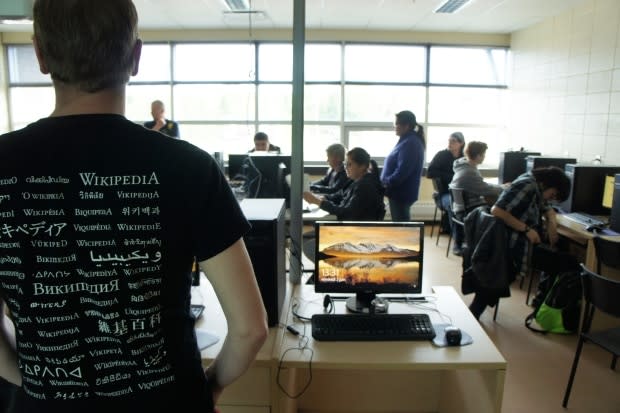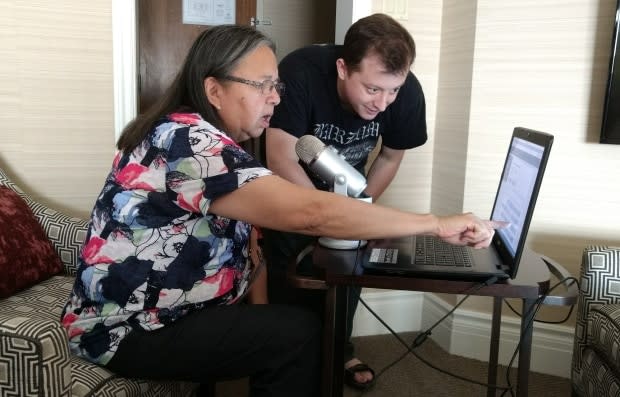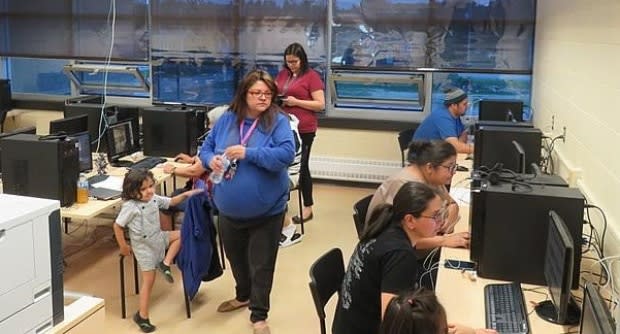'A way to keep our language alive': How the Atikamekw Nation uses Wikipedia to promote its language
What started out as a high school computer science project has grown into the only active Wikipedia in Canada operating in an Indigenous language.
Wikipetcia Atikamekw Nehiromowin includes over 1,000 articles, sound clips and photos representing life, history and culture of the three Atikamekw communities in Quebec.
"They cover common words, the cities of Quebec, and we also started Atikamekw toponymy [place names] focused on forest animals, vegetation and genealogy of our community," said Theresa Ottawa, co-ordinator of the Wikipetcia project since 2017.
"It is a young Wikipedia, and there is still a lot to do."
The UNESCO Atlas of the World's Languages in Danger lists the Atikamekw language's vitality as vulnerable, where most children speak the language, but it may be restricted to certain domains like at home or at school.
Ottawa said that's why a project like Wikipetcia is important to give language and culture a presence online where the majority of young people are spending their time using French as a second language.
"Our young people are more inclined to take refuge behind their devices than to go on the territory," said Ottawa, referring to the direct link between the language and land.
"Hence, the importance of joining them via their technology for the transmission of language and culture. Wikipedia is, in my opinion, an excellent platform for that," she said.
Benoit Rochon is the former president of Wikimedia Canada, the official Wikimedia chapter for Canada.. He said while there are Wikipedias in Cree and Inuktitut, the Atikamekw project is the only active Wikipedia being used in an Indigenous language in the country. It spent many years being worked on and tested in its incubator before it was released in 2017.
The incubator is home to 11 other Indigenous languages including Chipewyan, Innu-aimun, Michif, Gwich'in, Ktunaxa, Nakoda (Assiniboine), Nakoda (Stoney), Northwestern Ojibway, Mohawk, Mi'kmaw, and Siksika.
"It's fun when you type your own mother language in Google and the Wikipedia page pops up," Rochon said.

'For future generations'
Wikipetcia started six years ago as a pilot project in Luc Patin's science class at Otapi High School in Manawan, Que., about 150 kilometres northeast of Montreal, and evolved into a project that reclaims intergenerational knowledge through technology across the three Atikamekw communities.
Students in Grades 10 and 11 are continuing the project this school year.
Steffi Ottawa, 18, is a Grade 11 student who looks forward to contributing to the project again. She has already written two articles, one about the Innu nation and another about the Quebec city of Assomption.
"I hope to make more items this school year in order to preserve my language," she said.
"It is important to preserve it for future generations. More and more young people are going on the internet, and this is giving them a site where they can view it. It's also a way to keep our language alive."

Patin said the students will be focusing on developing pages for Atikamekw stories and legends, traditional activities and toponymy.
"The work will require a lot of research," he said. "I do not focus on the number of articles but on the quality."
Patin plans to develop a student newspaper to help younger students read and write in the language — one of the key problems they encountered when they started the project.

"Atikamekw is primarily an oral language," Patin said.
"It is very difficult to obtain written information, so we called on elders to come and tell stories Atikamekw language and culture through their memories."
While Atikamekw is still the predominant language spoken by about 8,000 people across Nitaskinan, the traditional territory of the Atikamekw Nation, Theresa Ottawa said young parents are speaking it less to their children at home.
"It does not escape the threat of disappearance if we are not careful," she said.
"Thanks to elders, we can preserve the language."
CBC Indigenous is highlighting a few of the many diverse Indigenous languages that exist across the country. Read more from the Original Voices project.


